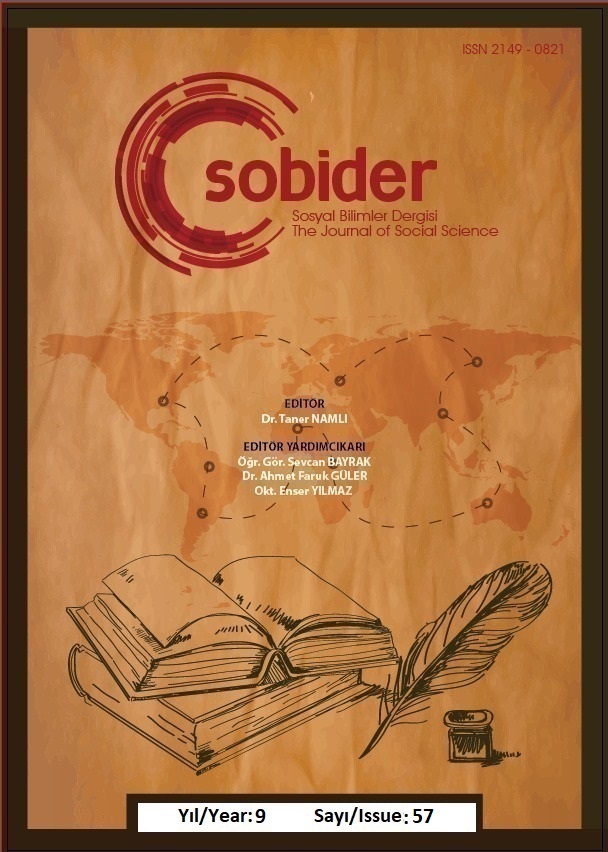Author :
Abstract
Sicariler ile ortaya çıkan dini motifli terör 20. yüzyılın başlarında Ortadoğu’dan uzaklaşmıştır. Din dışı motiflerle varlığını Avrupa’da sürdüren terör dini motif kazanarak yeniden Ortadoğu’ya dönmüş ve diğer ülkeleri etkilediği gibi Lübnan’ı da fazlasıyla etkilemiştir. Lübnan’ın dini terörden etkilenmesinin en büyük sebebi Arap-İsrail savaşları olmuştur. İsrail zulmünden kaçan Filistinlilerin Lübnan’da silahlı direniş örgütleri oluşturarak güçlenmesi, Lübnanlıların Filistin’den gelen bu göç dalgasıyla İsrail’in hedefi olacaklarını düşünmesi, Lübnan’ın çeşitli dinsel topluluklara ev sahipliği yapması ve Lübnan siyasetinin karmaşası ülkeyi iç savaşa sürüklemiştir. 15 yıl süren iç savaşta dışarıdan desteklenen farklı örgütler oluşmuştur. Hem İsrail’e karşı hem de Lübnan içindeki Hristiyanlara karşı mücadele eden Filistin Kurtuluş Örgütü, Suriye tarafından desteklenen EMEL hareketi ve EMEL Hareketinden kopan Şiileri bir çatı altında toplamak isteyen İran tarafından kurulan Hizbullah bölgedeki İslami örgütleri oluşturmuştur. Buna karşılık Hristiyan Lübnan milliyetçilerinin oluşturduğu Falanjistlerde ülke içinde silahlanmış ve eylemlerde bulunmuştur. Bu örgütlerin dini motifli iç savaşın ardından kendi içlerinde Lübnan siyasetine hakim olmak için rekabete girişmesiyle Lübnan, günümüze değin sürecek istikrarsızlık çukuruna düşmüştür. Çalışmamızda terör ve dini motifli terör kavramları açıklanmış, dini motifli terör örgütlerinden bahsedilmiştir. Lübnan İç Savaşı’nın gelişimine yer verilerek “Lübnan İç Savaşı’nın dini motifli teröre etkisi nedir?” sorusuna cevap aradığımız çalışmamızda betimsel alan analizi yöntemi kullanılmıştır.
Keywords
Abstract
The religious-motivated terror that emerged with the Sicari moved away from the Middle East at the beginning of the 20th century. Terrorism, which continued its existence in Europe with non-religious motifs, returned to the Middle East again by gaining a religious motif and greatly affected Lebanon as it affected other countries. The Arab-Israeli wars have been the biggest reason Lebanon has been affected by religious terrorism. The strengthening of the Palestinians fleeing the persecution of Israel by forming armed resistance organizations in Lebanon, the thought of the Lebanese to be the target of Israel with this wave of immigration from Palestine, Lebanon's hosting of various religious communities and the confusion of Lebanese politics dragged the country into civil war. In the civil war that lasted for 15 years, different organizations were formed that were supported from the outside. Fighting against both Israel and Christians in Lebanon, the Palestine Liberation Organization, the Syrian-backed AML movement and Iran's Hezbollah, which wanted to gather the Shiites who broke away from the AML Movement, under one roof, formed the Islamic organizations in the region. On the other hand, Falangists formed by Christian Lebanese nationalists took up arms and took action within the country. Lebanon has fallen into the pit of instability that will last until today, as these organizations entered into competition among themselves after the religious-motivated civil war.
In our study, the concepts of terrorism and religious-motivated terror are explained and religious-motivated terrorist organizations are mentioned. By including the development of the Lebanese Civil War, "What is the effect of the Lebanese Civil War on terrorism with religious motives?" In our study, in which we sought an answer to the question, descriptive field analysis method was used.
Keywords
- Bal, İ. (2006). TERÖRİZM, Terör, Terörizm ve Küresel Terörle Mücadelede Ulusal ve Bölgesel Deneyimler (12. b.). Ankara: USAK Yayınları.
- Bodur, H. E. (2005). Dini Motifli Terör Fenomeni Ve İslam’ın Siyasal İstismarı . KSÜ İlahiyat Fakültesi Dergisi , 3(5), 65-88.
- Çelik, Ü. (2012). İç Çatışmalar ve Dış Müdahaleler Arasında Lübnan. History Studies, 4(1), 125-155.
- Ergil, D. (1992). Uluslararası Terörizm. Ankara Üniversitesi SBF Dergisi, 47(3), 139-143.
- Karakurt, O. (2021). Trthaber. 03 22, 2022 tarihinde https://www.trthaber.com/haber/dunya/lubnanda-devleti-kilitleyen-siyasi-sistem570217.html adresinden alındı
- Kirman, M. A. (2004). Küresel Bir Sorun Olarak Din ve Şiddet. Dini Araştırmalar Dergisi, 7(20), 315-332.
- Kuyaksil, A. (2014). Terör Örgütlerinin İdeoloji Unsuru Olarak Kullandığı Bazı Dini Kavramlar. ASSAM Uluslararası Hakemli Dergi, 1(1), 79-114.
- Onat, H. (2015). T.C Kültür ve Turizm Bakanlığı Atatürk Kültür, Dil ve Tarih Yüksek Kurumu. 05 29, 2019 tarihinde http://www.ayk.gov.tr/wp-content/uploads/2015/01/ONATHasan-DİNSEL-TERÖRLE-BAŞ-ETMEDE-DİNLERARASI-İŞBİRLİĞİNİNÖNEMİ.pdf adresinden alındı
- Özerkmen, N. (2004). Terör, Terörizm ve Radikal İslamcı Terör. Ankara Üniversitesi Dil ve Tarih-Coğrafya Fakültesi Dergisi, 44(2), 247-265.
- Şimşek, M. (2016). Terörizm: Kavramsal Bir Çalışma. Akademik Bakış Dergisi(54), 319-335.
- Tozlu, M. (2016). Terörizm Bağlamında Hizbullah. Sosyal ve Beşeri Bilimleri Dergisi, 8(1), 39- 49.
- Uluç, F. E. (2013). Lübnan'da Bitmeyen İç Savaş. 05 29, 2019 tarihinde https://www.academia.edu/30394410/LÜBNAN_BİTMEYEN_İÇSAVAŞ.doc.pdf adresinden alındı
- Terörle Mücadele Kanunu, 1991, 3713 Sayılı Terörle Mücadele Kanunu, Görüntüleme Tarihi: 28/05/2019 http://www.mevzuat.gov.tr/MevzuatMetin/1.5.3713.pdf





